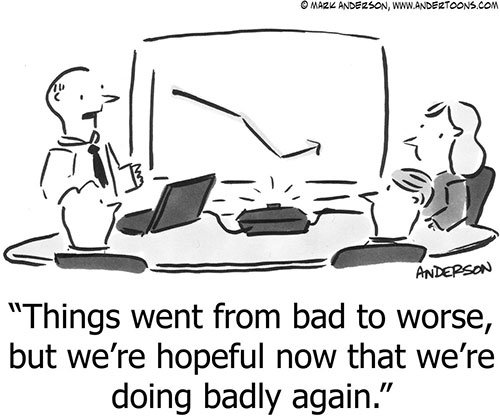|
The word bad is an adjective used to modify nouns and pronouns.
Example: She was in a bad accident.
Adverbs often end in ly. The word badly is an adverb that answers how about the verb.
Example: She was hurt badly in the accident.
The confusion comes with four of the sense verbs: taste, look, smell, and feel.
When we use these verbs actively, we should follow them with adverbs. (Hear is always used actively.)
When we use these verbs descriptively, we should follow them with adjectives.
Examples:
I feel bad about having said that.
I am not feeling with fingers in the above example; I am describing my state of mind, so the adjective is used (no ly).
She feels badly since her fingers were burned.
She feels with her fingers here so the adverb (ly form) is used.
You can use this same rule about sense verbs with adjectives and adverbs other than bad and badly.
Examples:
The mask over his face made him look suspicious to the police.
He did not look with eyes. Look describes his appearance so the adjective is needed.
She looked suspiciously at the $100 bill.
She looked with eyes so the adverb is needed.
She looked good for someone who never exercised.
She didn’t look with eyes. Good is describing her appearance so the adjective is needed.
He smelled well for someone with a cold.
He is actively smelling with his nose so the adverb is needed.
Rule: Well, although more often an adverb, functions as an adjective when referring to health.
Example: He doesn't feel well enough today to come to work.
|
View and comment on this
article on our website.
|
|
Pop Quiz
1. Please don’t feel bad/badly about forgetting to call me.
2. His face looked bad/badly bruised after being punched.
3. She looked cautious/cautiously at the man ahead of her.
4. She feels cautious/cautiously when walking alone at night.
5. She smelled good/well after spraying perfume on her neck.
6. If you feel good/well enough on Saturday, we hope you will join us for dinner.
|
Free BONUS Quiz for You!
[[firstname]], because you are a subscriber to the newsletter, you get access to one of the Subscribers-Only Quizzes. Click here to take a Than vs. Then Quiz and get your scores and explanations instantly!
We will be adding many more quizzes this year to our already substantial list of quizzes. If you have suggestions for topics we have not yet covered, please send us a message at help@grammarbook.com.
|
Hundreds of Additional Quizzes
at Your Fingertips
Subscribe now to receive hundreds of additional English usage quizzes not found anywhere else!
Teachers and Employers
Save hours of valuable time! You may assign quizzes to your students and employees and have their scores tallied, organized, and reported to you! Let GrammarBook.com take the hassle out of teaching English!
"Fun to test my skills."
"The explanations really help ... thanks!"
"I can select the quizzes to assign to my students, and then the results are reported to me automatically!"
|

|
Don't need all the quizzes?
You can now purchase the same quizzes individually for ONLY 99¢ each.
Purchase yours here. |
If you think you have found an error in a quiz, please email us at help@grammarbook.com
|
 |
The Blue Book of Grammar and Punctuation
by Jane Straus, Lester Kaufman, and Tom Stern |
The Authority on English Grammar! Eleventh Edition Now Available
An indispensable tool for busy professionals, teachers, students, homeschool families, editors, writers, and proofreaders.
Available in print AND as an e-Book! Over 2,000 copies are purchased every month!
The publisher of The Blue Book, Jossey-Bass, A Wiley brand, is offering a 35 percent discount for those of you who order the book through Wiley.com. Shipping and tax are not included. Simply go to bit.ly/1996hkA and use discount code E9X4A.
Offer expires December 31, 2020.
|
Wordplay

Pop Quiz Answers
1. Please don’t feel bad about forgetting to call me.
2. His face looked badly bruised after being punched.
3. She looked cautiously at the man ahead of her.
4. She feels cautious when walking alone at night.
5. She smelled good after spraying perfume on her neck.
6. If you feel well enough on Saturday, we hope you will join us for dinner.
|
 |
English In A Snap:
68 One-Minute English Usage Videos FREE |
Learn all about who and whom, affect and effect, subjects and verbs, adjectives and adverbs, commas, semicolons, quotation marks, and much more by just sitting back and enjoying these easy-to-follow lessons. Tell your colleagues (and boss), children, teachers, and friends. Click here to watch.
|
|





